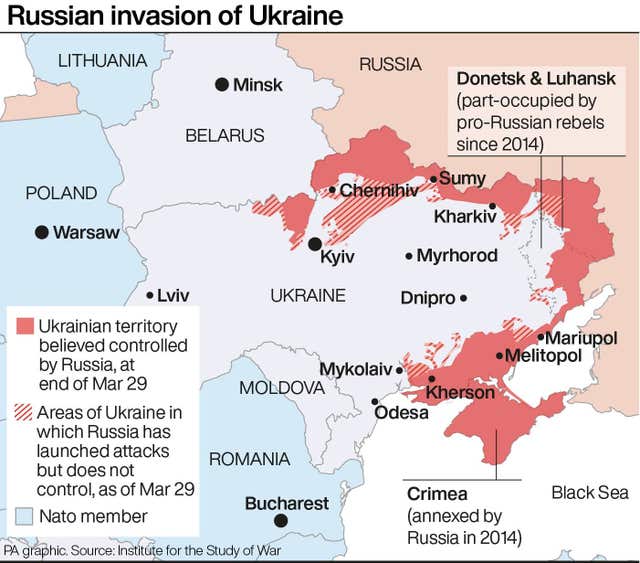Ukrainian leader says country’s defence ‘at turning point’
Volodymyr Zelensky has appealed to US President Joe Biden for more help.

The Ukrainian leader has said his country’s defence against the Russian invasion is at a “turning point”, as he pressed the United States for more help hours after the Kremlin’s forces reneged on a pledge to scale back operations.
Russian bombardment of areas around Kyiv and the northern city of Chernihiv and intensified attacks elsewhere in the country further undermined hopes for progress toward ending the bloody conflict.
Civilians trapped in besieged cities have shouldered some of the worst suffering, though both sides said on Thursday that they would attempt another evacuation from the port city of Mariupol.
Talks between Ukraine and Russia are set to resume Friday by video, according to the head of the Ukrainian delegation, David Arakhamia.
A delegation of Ukrainian legislators visited Washington on Wednesday to push for more US assistance, saying their nation needs more military equipment, more financial help and tougher sanctions against Russia.
“We need to kick Russian soldiers off our land, and for that we need all, all possible weapons,” Ukrainian parliament member Anastasia Radina said at a news conference at the Ukrainian Embassy.

Ukrainian President Volodymyr Zelensky made the case directly to his US counterpart Joe Biden.
In his nightly address to the nation, he said: “If we really are fighting for freedom and in defence of democracy together, then we have a right to demand help in this difficult turning point.
“Tanks, aircraft, artillery systems. Freedom should be armed no worse than tyranny,” Mr Zelensky said, as he stood in the dark outside the dimly-lit presidential offices in Kyiv.
He thanked the US for an additional 500 million dollars (£380 million) in aid that was announced on Wednesday.
There seems little faith in Russia and Ukraine will resolve the conflict soon, particularly after the Russian military’s U-turn and its most recent attacks.

Russia said it would de-escalate operations near Kyiv and Chernihiv to “increase mutual trust and create conditions for further negotiations”.
Mr Zelensky and the West were sceptical. Soon afterwards, Ukrainian officials reported that Russian shelling was hitting homes, stores, libraries and other civilian sites in or near those areas.
Russian troops also stepped up their attacks on the Donbas region in the east and around the city of Izyum, which lies on a key route to the Donbas, after redeploying units from other areas, Ukrainian officials said.
Olexander Lomako, secretary of the Chernihiv city council, said the Russian announcement turned out to be “a complete lie”.

“At night they didn’t decrease, but vice versa increased the intensity of military action,” Mr Lomako said.
Five weeks into the invasion that has left thousands dead, the number of Ukrainians fleeing the country topped a staggering four million, half of them children, according to the United Nations.
Mr Zelensky said the continuing negotiations with Russia were only “words without specifics”.
He said Ukraine is preparing for concentrated new strikes on the Donbas.

Mr Zelenskyy also said he had recalled Ukraine’s ambassadors to Georgia and Morocco, suggesting they had not done enough to persuade those countries to support Ukraine and punish Russia for the invasion.
“With all due respect, if there won’t be weapons, won’t be sanctions, won’t be restrictions for Russian business, then please look for other work,” he said.
During talks on Tuesday in Istanbul, the faint outlines of a possible peace agreement seemed to emerge when the Ukrainian delegation offered a framework under which the country would declare itself neutral – dropping its bid to join Nato, as Moscow has long demanded – in return for security guarantees from a group of other nations.
Top Russian officials responded positively, with foreign minister Sergey Lavrov saying that Ukraine’s willingness to accept neutrality and look outside Nato for security represents “significant progress”, according to Russian news agencies.
But those statements were followed by attacks.





